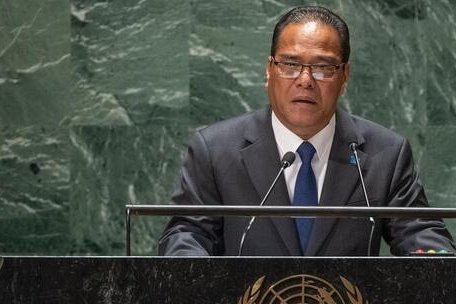Micronesian President Wesley Simina has told the United General Assembly in New York, his island nation want climate action, not promises.
“Countries like mine, and people like mine are the frontlines of climate change. But we don’t need more promises. What we need is action. For promises to turn into policy and for policy to turn into proactive steps towards real solutions.
As islanders, resilience is in our DNA, but let me remind you that our resilience is not a placeholder for continued inaction,” President Simina told world leaders.
He said the climate crisis is indeed impacting health security, food security, water security, economic security and peace security.
“It is without a doubt, an existential threat. We reiterate our call for the appointment of a Special Representative for Climate and Security to address these threats.
“We also call for the full operationalisation of the new Loss & Damage Fund at COP 28, in order to equip those who are most affected by climate change to deal with the ongoing loss and damage impacts that are faced every day. It is time for those most responsible for climate change to put your money where your mouth is, for the cost of not doing so, is far greater than what could ever be quantified.
“Unfortunately, the international community has not done nearly enough to get us on track to limiting the global average temperature increase to 1.5 degrees Celsius. One need only scan the news on any random day to see the evidence of the climate crisis in devastating effects around the world today.
Loss and damage caused by the climate crisis is accumulating every day in Micronesia, and it will continue to worsen at a faster pace as tipping points are reached,” President Simina told the UN General Assembly.
He said the world need a fast-acting mandatory approach which should be modeled on the Montreal Protocol on Substances that Deplete the Ozone Layer, the best environmental agreement ratified by every UN member state.
“We should use this work-horse treaty – the little engine that could – as a model for a new agreement to cut methane, the blowtorch pushing the planet from global warming to global boiling.
While Micronesia has negligible global emissions, it has bold ambitions to limit its emissions. Through our NDC Strategy, by 2030 we aim to reduce CO2 emissions from electricity generation by more than 65% below 2000 levels. By 2050 Micronesia will achieve ‘net zero’. This bold pledge will result in a healthier, happier and climate resilient island nation,” said President Simina.
He said Micronesia is proud to announce that they have recently adopted an amendment to their national constitution that recognises the right of its people to a healthy environment.
“As custodians of our natural heritage, we adopted the amendment in part to underscore that this right is a general principle of international law applicable to all States, including major contributors to the climate crisis. We need all available tools to fight the climate crisis, including those provided to us under international law.
For this reason, Micronesia is proud to have been a member of the core group of countries that advocated for the adoption by this body of a resolution requesting an advisory opinion from the International Court of Justice on obligations of States and consequences under international law in relation to climate change,” he said.
This week, President Simina joined fellow Leaders in the High Ambition Coalition on Climate Change in issuing a statement with a strong call for action.
“Micronesia strongly implores all Parties to the Paris Agreement – particularly major emitters from the developed and developing world – to commit by COP28 to major reductions of emissions of at least half by 2030, with peaking of emissions by 2025, and peg their net zero goals to no later than 2050, in line with the recommendations of the IPCC. As part of this effort, countries should eliminate the emissions of methane, HFCs, and other short-lived climate pollutants from their industrial products and activities, which altogether could result in the avoidance of at least 0.5 degree Celsius of global warming.
“The Intergovernmental Panel on Climate Change tells us that current nationally determined contributions under the Paris Agreement, if fully implemented, will still lead to over 2 degrees Celsius of warming by the end of this century, with 3 degrees Celsius being a distinct possibility.
This is an existential threat for my country and many other small island developing States. And yet, major emitters, including from the developing world, have yet to commit to updating their nationally determined contributions as part of this global stocktake in order to get us on a 1.5 degrees’ Celsius track,” President Simina stressed to world leaders in New York.
SOURCE: PACNEWS














